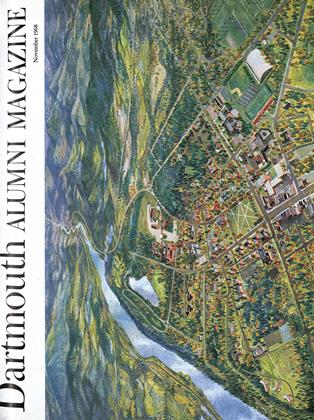MAN INCORPORATE, THE INDIVIDUAL AND HIS WORK IN AN ORGANIZED SOCIETY.
November 1968 LAURENCE I. RADWAYMAN INCORPORATE, THE INDIVIDUAL AND HIS WORK IN AN ORGANIZED SOCIETY. LAURENCE I. RADWAY November 1968
By Carl B. Kaufmann '47. Garden City, New York: Doubleday & Company, Inc., 1967. 281 pp.$5.95.
This is essentially a reasoned defense of the large, scientifically advanced corporation in modern America. Its author, a Du Pont executive with varied public relations experience, is evidently familiar with criticisms of business enterprise advanced by unsympathetic sociologists and economists from the New Deal to the New Left. Moreover, he is far too astute to dismiss them out of hand. But his final verdict is that the corporation is "an extraordinarily useful social device." En route to this conclusion he makes clear his own robust faith in hard work, organization, cities, the market economy, and modern technology. And he turns the tables rather deftly on liberal 'academicians by emphasizing phasizingthe institutional conservatism of the university.
The first half of the book includes a set of four highly condensed historical essays. The first deals with the development of economic institutions and makes a case for the superiority of large, specialized business enterprises. The second is a history of technology, one moral of which is that inventions generate surpluses which support educational and cultural advances. The third, which depicts changing attitudes toward work, defends the dignity of labor against "aristocratic" ideals. The fourth examines the low repute in which trade was often held in former times.
There are some unduly sweeping generalizations here, e.g. that aesthetic and humanistic values thrive best where there is optimum use of technology. One thinks of Hitler's Germany! There are also some highly debatable assertions, e.g. that Marx "cared little for the subjective or moral questions surrounding man's work." On the whole, moreover, this earlier part of the work, despite allusions to such authorities as Weber, Troeltsch, and Pirenne, is less satisfying than the second part, where the author stands or: more familiar ground.
Here I found particularly valuable his account of the increasing importance in many industries of professionals, many with doctorates; the virtual disappearance of un- skilled labor; the declining role of the assembly line; and the power in recruiting of such non-cash incentives as cultural amenities, professional prerogatives (including sabbaticals), and the aesthetic appeal of the neighborhood in which a plant is located.
Because the author apparently hoped to reach a large audience, his book is written simply, perhaps too simply at the start. But its depth and pace pick up with each succeeding chapter and my own judgment is that the work as a whole dispels many more illusions than it creates.
A member of the Department of Government at Dartmouth, Professor Radwayteaches courses in Public Bureaucracy andPolicy Development and Conduct of American Foreign Relations.
 View Full Issue
View Full Issue
More From This Issue
-
 Feature
FeatureThe Woes of the Hoit Brothers
November 1968 By John Hurd '21 -
 Feature
FeatureTHE VICE VERSA VIRTUES
November 1968 -
 Feature
Feature1953's Triple Alliance
November 1968 By CLIFF JORDAN '45 -
 Feature
FeatureANOTHER COLLEGE YEAR BEGINS
November 1968 -
 Article
ArticleWith the Big Green Teams
November 1968 -
 Class Notes
Class Notes1935
November 1968 By RICHARD K. MONTGOMERY, C. HALL COLTON, THOMAS E. WILSON
LAURENCE I. RADWAY
-
 Feature
FeatureHow Much Government?
March 1954 By LAURENCE I. RADWAY -
 Books
BooksTHE POLITICS OF DISTRIBUTION.
June 1956 By LAURENCE I. RADWAY -
 Books
BooksFREEDOM OF SPEECH BY RADIO AND TELEVISION.
APRIL 1959 By LAURENCE I. RADWAY -
 Feature
FeatureCITIZEN SOLDIERS
October 1973 By LAURENCE I. RADWAY -
 Books
BooksNot in the Stars
January 1976 By LAURENCE I. RADWAY -
 Books
BooksThe New Right
November 1979 By Laurence I. Radway
Books
-
 Books
BooksThe latest musical composition
MARCH 1932 -
 Books
BooksFaculty Authors
November 1944 -
 Books
BooksTHE UPPER TANANA INDIANS.
November 1959 By ALFRED F. WHITING -
 Books
BooksCORPORATE CONCENTRATION AND PUBLIC POLICY
April 1943 By G. W. Woodworth -
 Books
BooksCONTEMPORARY UNIONISM IN THE UNITED STATES
January 1949 By Ross Stagner -
 Books
BooksTHE STORY OF PITNEY-BOWES.
October 1961 By WAYNE G. BROEHL JR.


